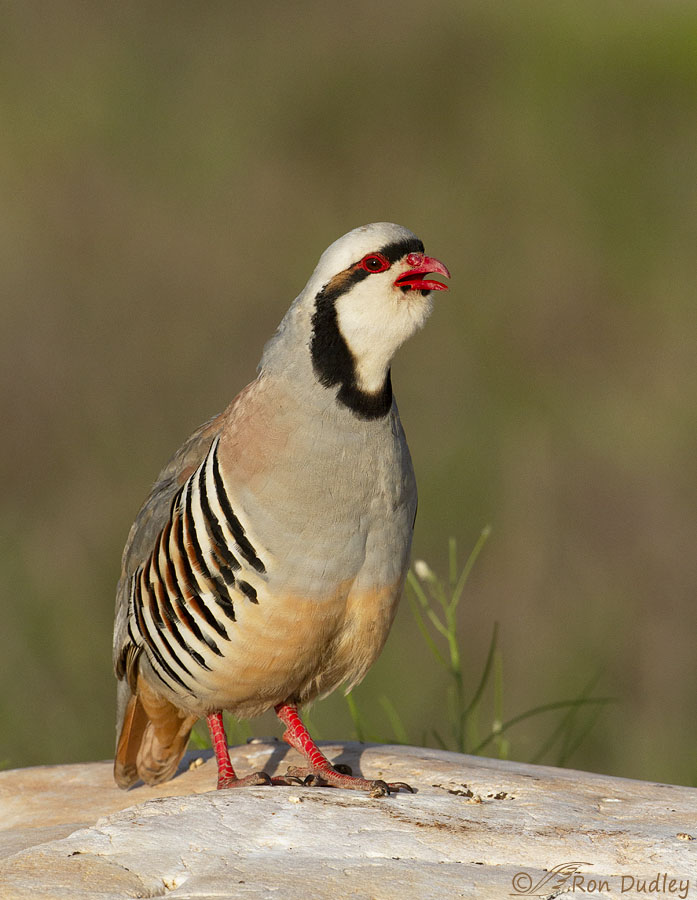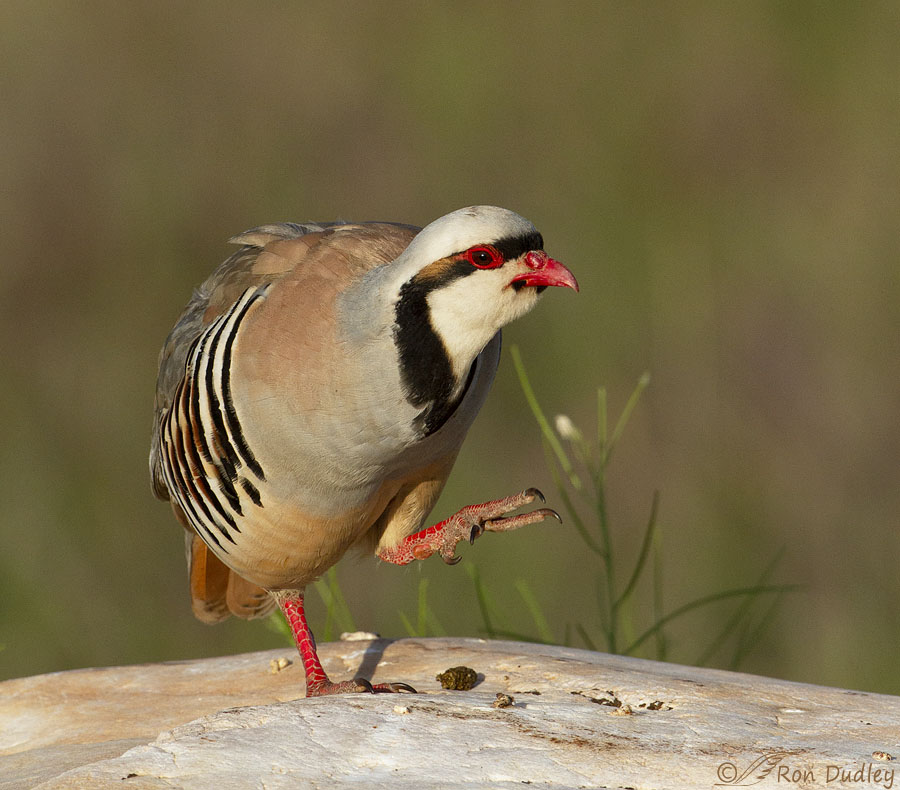At least I think that’s what ‘he’ was doing.
1/3200, f/8, ISO 500, Canon 7D, Canon EF 500mm f/4L IS II USM, not baited, set up or called in
These are older photos taken on Antelope Island several years ago. I’d already taken several photos of him as he was posing and calling while I was very close to him. I’d taken my teleconverter off and had been shooting vertically while he was upright, which is why I have so little room on the right.
At that point he apparently decided I was a little too close for comfort so he suddenly hunkered down and raised one foot just prior to ‘sneaking’ over the front edge of the rock and jumping down into the vegetation below, which is typical Chukar behavior. Chukars rarely fly.
That’s when I took this shot. I’m posting it because it’s an unusual pose and I like it.

1/3200, f/8, ISO 500, Canon 7D, Canon EF 500mm f/4L IS II USM, not baited, set up or called in
But then he changed his mind about leaving and started calling again. I got quite a few nice photos of him as he was calling but it’s the “sneaky” pose that appeals to me most, probably just because it’s different.
Ron
Note: I’m having serious and mysterious computer problems this morning. I wasn’t even sure I’d be able to publish this post. Who knows how it might affect Feathered Photography down the road so expect the unexpected over the next few days.
Update: My computer issue may be fixed now. It’s working at the moment so time will tell…



He really does look like he’s trying to fake you out.
I thought so.
I can’t imagine this beautiful bird (even a sneaky one) tastes as great as it looks — shooting it with anything but a camera is a travesty! ♥️ Chukars!
That’s pretty much how I feel, Chris.
Of course he was being sneaky. Which just reinforces me thinking of him and his family as the Beagle Boys.
I do hope that your ‘puter stays fixed.
Fingers crossed, EC. So far so good but I still don’t know why it went kaput on me in the first place so it could happen again.
The timing of this post is perfect! I just finished watching a video about being stealthy in all kinds of armor, including full-plate. (And yes, it can be done.)
From the variety of a certain substance, it looks like that rock is a pretty popular spot. The first shot makes the Chukar look like he’s stepping over a “point of interest,” as my friend’s mom used to call digestive landmines in the grass.
Marty, it’s pretty hard to avoid poop piles in Chukar photos, especially during the breeding season, because they habitually use the same rock perches to call from.
I can interpret the first photo a number of ways, all of them comically sneaky. Also reminds me of the first steps Dorothy and friends took as they embarked on the yellow brick road. In the second photo she is obviously singing “We’re off to see the wizard…”
Thanks for the earworm, Lyle!
At least it’s replaced “You’re Gonna Miss Me When I’m Gone”. Or it did until I typed it…
To me they are comical looking. We use to have them in the foothills in Centerville when I was growing up. My neighbor hunted them in the fall. I did not learn they were introduced until I was in my 30’s. I hope they are more prosperous on the Island in future years.
Sorry about the computer, I am very lucky to have Eric still living with us. He is a great helper.
April, it’s been so long I can’t even remember the last time I saw a Chukar on the island. I think I remember hearing some earlier this spring but didn’t see any,
They are up higher in the rocks. I see them when hiking. I wonder if more human visitation has them looking for more solitude.
Could be.
Good to see your Chukar back again. He sure does look sneaky in these photos. Have never seen one and possibly never will. They are not even shown in our list of Prescott birds.
Your use of sneaky reminds me of one of my least favorite words – snuck. I always use the word sneaked, but have heard highly educated persons use snuck. I have seen Senators and other notables using snuck while being interviewed. Merriam-Webster says that how snuck became part of our language is a mystery, but it is there and you will probably here more people today say snuck instead of sneaked.
Everett, I always notice when folks use “snuck”. I find it distracting because it takes my attention away from the subject at hand.
Personally, I prefer “snack.”
Chukars are SO beautiful ! I know their colors and markings are
striking year round, but I’m wondering if they intensify near mating season
as other species’ do ? Your subject’s coloration seems to be especially
flashy ( and he/she also looks to be doing “the hokey pokey” in the first
shot )– how many of your posse are old enough to remember what THAT is ?
Kris, they’re colors are more vivid in spring and early summer. Later in the summer they “wear to dark” and look pretty splotchy and ragged.
https://www.featheredphotography.com/blog/2016/08/23/birds-wearing-to-dark-chukars-and-loggerhead-shrikes/
These photos were taken in mid-June.
I guess no matter what member of the animal kingdom we inhabit, we all need to “sneak“ in the same way… Hunker down, with exaggerated steps. It seems so comical… But maybe the high stepping is because the leg needs to be drawn close to the body to maintain the balance before each carefully plotted step forward… What do you think, Ron? Am I missing a whole genus of sneaks who skulk about in a different way?
Alison, all I know is that this posture is pretty typical when they’re trying to be stealthy as they leave an elevated perch. When they’re not trying to be stealthy they walk more upright.
Wonderful images!
Thanks, Laval.
I’m pretty sure he was flirting with you!
If so I hope he is really a she…
The Chukar’s are lovely little birds…. Glad you caught him ready to head for the brush.
Glad you caught him ready to head for the brush.  Their feather configuration almost looks painted on at times.
Their feather configuration almost looks painted on at times.
The “joys” of computers….
Judy, right now I’m finding no joy in them at all.
Interesting beautiful bird! I have never heard of this bird so the info and history on it is very informative as they are unique to your area, see https://en.wikipedia.org/wiki/Chukar_partridge
Thanks, Terri. Actually Chukars have been introduced into quite a few areas, primarily for hunting purposes.